For the 2025 school year, there are 9 public elementary schools serving 2,806 students in Cocke County School District. This district's average elementary testing ranking is 4/10, which is in the bottom 50% of public elementary schools in Tennessee.
Public Elementary Schools in Cocke County School District have an average math proficiency score of 32% (versus the Tennessee public elementary school average of 35%), and reading proficiency score of 29% (versus the 36% statewide average).
Minority enrollment is 9% of the student body (majority Hispanic), which is less than the Tennessee public elementary school average of 43% (majority Black).
Overview
This School District
This State (TN)
# Schools
12 Schools
1,500 Schools
# Students
4,295 Students
719,413 Students
# Teachers
275 Teachers
48,388 Teachers
Student : Teacher Ratio
16:1
16:1
District Rank
Cocke County School District, which is ranked within the bottom 50% of all 147 school districts in Tennessee (based off of combined math and reading proficiency testing data) for the 2021-2022 school year.
The school district's graduation rate of 92% has decreased from 93% over five school years.
Overall District Rank
#105 out of 147 school districts
(Bottom 50%)
(Bottom 50%)
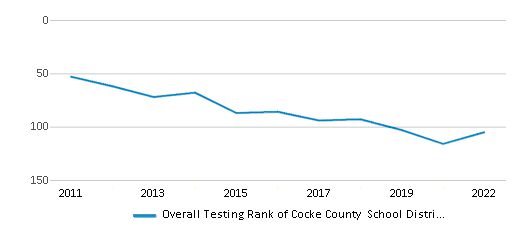
Math Test Scores (% Proficient)
25%
31%
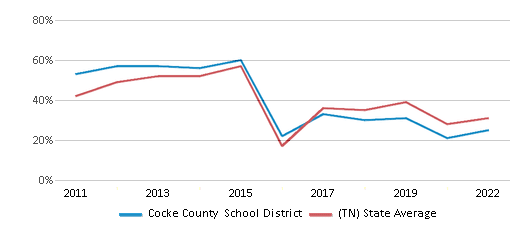
Reading/Language Arts Test Scores (% Proficient)
30%
37%
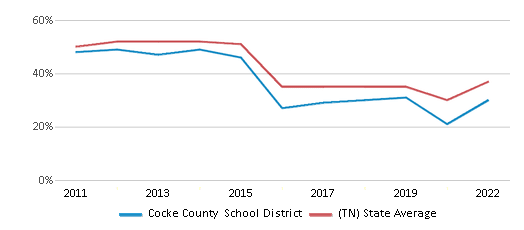
Science Test Scores (% Proficient)
38%
40%
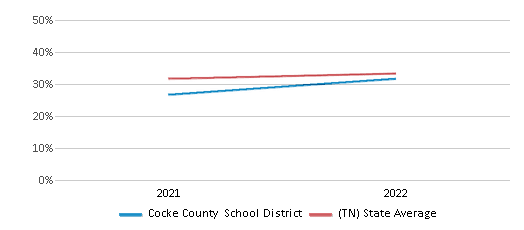
Graduation Rate
92%
90%
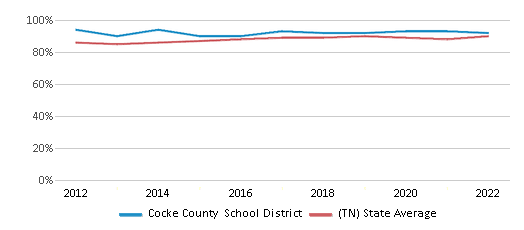
Students by Ethnicity:
Diversity Score
0.20
0.61
# American Indian Students
6 Students
1,225 Students
% American Indian Students
n/a
n/a
# Asian Students
20 Students
15,029 Students
% Asian Students
1%
2%
# Hispanic Students
198 Students
106,507 Students
% Hispanic Students
5%
15%
# Black Students
95 Students
149,772 Students
% Black Students
2%
21%
# White Students
3,840 Students
410,765 Students
% White Students
89%
57%
# Hawaiian Students
4 Students
856 Students
% Hawaiian Students
n/a
n/a
# Two or more races Students
132 Students
35,256 Students
% of Two or more races Students
3%
5%
Students by Grade:
# Students in PK Grade:
106
29,574
# Students in K Grade:
286
74,511
# Students in 1st Grade:
295
76,014
# Students in 2nd Grade:
302
77,971
# Students in 3rd Grade:
311
74,743
# Students in 4th Grade:
311
75,052
# Students in 5th Grade:
303
75,941
# Students in 6th Grade:
295
75,064
# Students in 7th Grade:
279
70,062
# Students in 8th Grade:
318
69,763
# Students in 9th Grade:
370
5,469
# Students in 10th Grade:
385
5,392
# Students in 11th Grade:
395
4,910
# Students in 12th Grade:
339
4,947
# Ungraded Students:
-
-
District Revenue and Spending
The revenue/student of $12,554 is higher than the state median of $11,979. The school district revenue/student has stayed relatively flat over four school years.
The school district's spending/student of $11,498 is higher than the state median of $11,478. The school district spending/student has stayed relatively flat over four school years.
Total Revenue
$54 MM
$12,104 MM
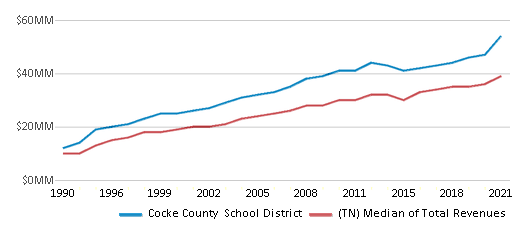
Spending
$49 MM
$11,597 MM
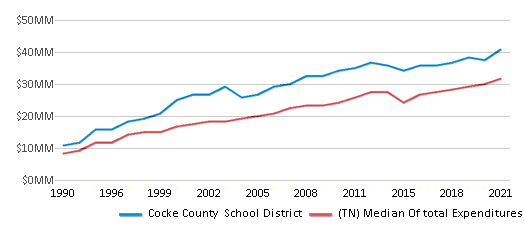
Revenue / Student
$12,554
$11,979
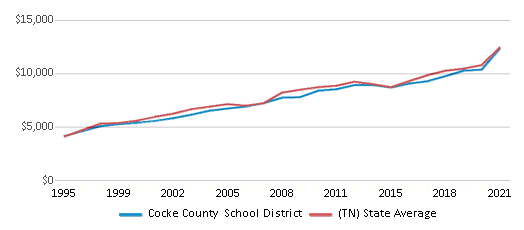
Spending / Student
$11,498
$11,478
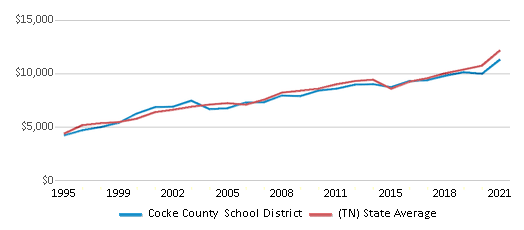
Best Cocke County School District Public Elementary Schools (2025)
School
(Math and Reading Proficiency)
(Math and Reading Proficiency)
Location
Grades
Students
Rank: #1 - 21. - 2.
Grassy Fork Elementary School
(Math: 45-49% | Reading: 40-44%)
Rank:
Rank:
9/
Top 20%10
4120 Big Creek Rd
Hartford, TN 37753
(423) 487-5835
Hartford, TN 37753
(423) 487-5835
Grades: K-8
| 124 students
Rank: #1 - 21. - 2.
Smoky Mountain Elementary School
(Math: 45-49% | Reading: 40-44%)
Rank:
Rank:
9/
Top 20%10
135 South 32 Hwy
Cosby, TN 37722
(423) 487-2255
Cosby, TN 37722
(423) 487-2255
Grades: PK-8
| 187 students
Rank: #33.
Centerview Elementary School
(Math: 35-39% | Reading: 35-39%)
Rank:
Rank:
7/
Top 50%10
2400 Hwy 160
Newport, TN 37821
(423) 623-4947
Newport, TN 37821
(423) 623-4947
Grades: PK-8
| 240 students
Rank: #44.
Cosby Elementary School
(Math: 38% | Reading: 33%)
Rank:
Rank:
6/
Top 50%10
3320 Cosby Hwy
Cosby, TN 37722
(423) 487-3850
Cosby, TN 37722
(423) 487-3850
Grades: K-8
| 437 students
Rank: #55.
Parrottsville Elementary School
(Math: 34% | Reading: 36%)
Rank:
Rank:
6/
Top 50%10
1901 Highway 321
Parrottsville, TN 37843
(423) 623-1612
Parrottsville, TN 37843
(423) 623-1612
Grades: PK-8
| 506 students
Rank: #66.
Del Rio Elementary School
(Math: 30-39% | Reading: 30-39%)
Rank:
Rank:
6/
Top 50%10
500 South Highway 107
Del Rio, TN 37727
(423) 487-5570
Del Rio, TN 37727
(423) 487-5570
Grades: K-8
| 86 students
Rank: #77.
Bridgeport Elementary School
(Math: 34% | Reading: 28%)
Rank:
Rank:
5/
Bottom 50%10
1935 Edwina Bridgeport Rd
Newport, TN 37821
(423) 623-5780
Newport, TN 37821
(423) 623-5780
Grades: PK-8
| 287 students
Rank: #88.
Edgemont Elementary School
(Math: 27% | Reading: 21%)
Rank:
Rank:
4/
Bottom 50%10
375 Carson Springs Rd
Newport, TN 37821
(423) 623-2288
Newport, TN 37821
(423) 623-2288
Grades: PK-8
| 561 students
Rank: #99.
Northwest Elementary School
(Math: 9% | Reading: 11%)
Rank:
Rank:
1/
Bottom 50%10
344 Woodson Rd
Newport, TN 37821
(423) 623-4697
Newport, TN 37821
(423) 623-4697
Grades: PK-8
| 378 students
Recent Articles

Year-Round Or Traditional Schedule?
Which is more appropriate for your child? A year-round attendance schedule or traditional schedule? We look at the pros and cons.

Why You Should Encourage Your Child to Join a Sports Team
Participating in team sports has a great many benefits for children, there is no doubt. In this article you will learn what those benefits are.

White Students are Now the Minority in U.S. Public Schools
Increasing birth rates among immigrant families from Asia and Central and South America, combined with lower birth rates among white families, means that for the first time in history, public school students in the United States are majority-minority. This shift in demographics poses difficulties for schools as they work to accommodate children of varying language abilities and socio-economic backgrounds.





